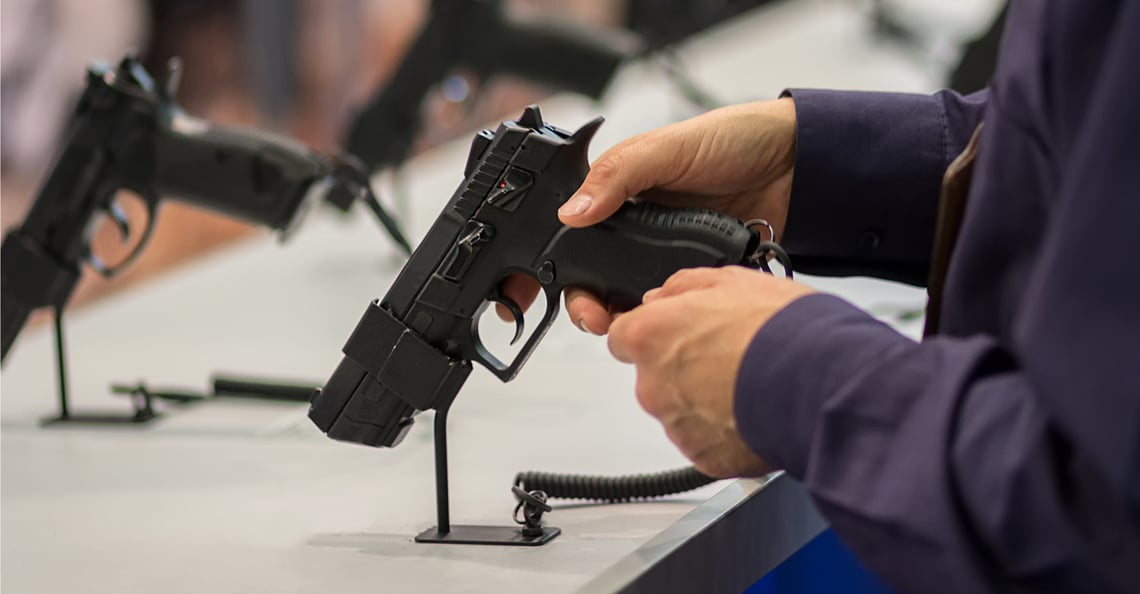A sweeping study of gun ownership by the Pew Research Center reveals a stark divide in opinion about the role of guns in society, the extent to which gun violence is a serious problem that needs to be addressed, and whether firearms should be more strictly regulated.
The Pew survey found that attitudes around gun policy and ownership break down largely along partisan lines, but overall, the majority of Americans favor universal background checks and gun prohibitions for terror suspects and the mentally ill.
Nearly a third of Americans own guns, the study found, and a disproportionate amount of gun owners are white, male, Republican, middle-aged, and living in rural areas. The number of gun owners who say they own a firearm for protection is nearly twice the number of those who have one for hunting.
Nearly half of the survey’s respondents said they knew someone who has been shot, and 3 percent reported having been shot themselves.
The findings on gun ownership largely jibe with a 2016 study conducted by Harvard and Northeastern universities, which revealed a cultural shift in American gun ownership patterns since the last comprehensive study had been conducted two decades earlier.
Two-thirds of gun owners have more than one gun, and of those, 29 percent report owning five or more. For gun owners who possess a single firearm, that gun is most likely a pistol. For more than a third of gun owners, a firearm is often close at hand: 38 percent said they keep a firearm loaded and easily accessible in their homes, while a quarter of handgun owners say they often carry a firearm outside their home.
Non-gun owners are more likely than gun owners to say that safe gun storage and gun safety courses and training are essential. And not all the gun owners who believe safe storage is important are practicing it themselves: While 63 percent say keeping guns secured is “essential,” that same percentage report at least one unlocked gun in their home.
More than half of all respondents said gun laws should be stricter. The survey found some areas of policy agreement among gun owners and non-gun-owners: Majorities of both groups favor background checks for private sales and at gun shows, as well as limiting access to guns for people with mental illnesses and those on no-fly or terror-watch lists. But while more than three-quarters of people without guns favor the creation of a federal database to track gun sales, only about half of gun owners do.
Owning a gun appears to affect how Americans view the scope of gun violence in the United States. Half of all adults say American gun violence is a “very big problem” — but only 33 percent of gun owners do. An overwhelming majority of both gun owners and non-gun-owners believe that the ease with which people can access illegal guns contributes to gun violence, but far more non-owners also blame access to legal guns, 67 percent, compared to 44 percent of gun owners.
More than 100,000 people are struck by a bullet each year in America, according to the Centers for Disease Control. This pervasiveness turns up among the Pew poll’s respondents. Forty-four percent of adults said they know someone who’s been shot, while blacks are more likely than whites to be acquainted with a gunshot victim (57 percent vs. 43 percent), and the odds of knowing someone who’s been shot appear to decrease with the level of education attained (49 percent of those with high school degrees vs. 37 percent of those with bachelor’s degrees) and increase depending on gun ownership (51 percent of gun owners vs. 40 percent of non-owners). Three times as many gun owners (6 percent) than non-owners (2 percent) say they’ve been shot themselves.
Pew derived the data from a telephone poll of 3,930 respondents conducted over two weeks in March and April.




